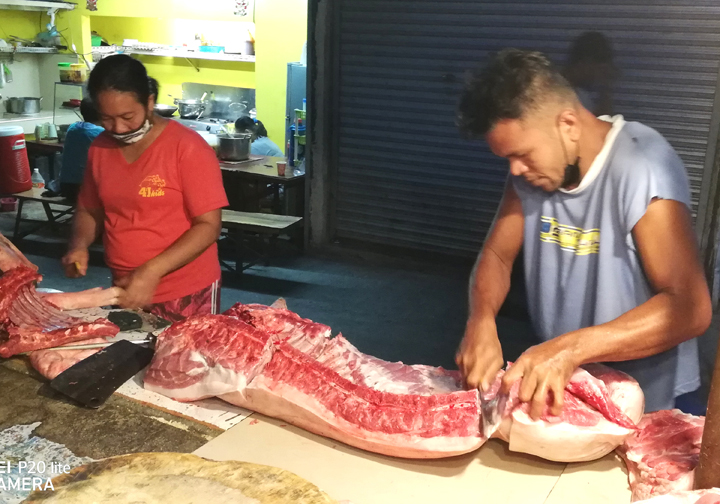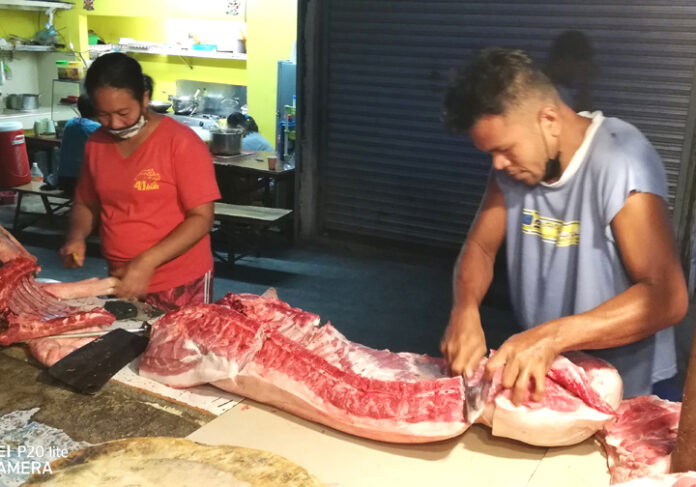
Image credits: PNA/Ben Briones
SENATORS on Wednesday decided to up the ante in the campaign against moves to cut pork tariffs by crafting a resolution, on top of a letter sent earlier to Malacañang by two of their members, asking President Duterte to reject the proposal for lower tariffs.
They echoed concerns raised earlier by Senators Cynthia Villar and Imee Marcos that slashing tariffs on top of a move to increase minimum access volume (MAV) for pork imports is unnecessary and would kill the local hog industry. This, without substantially addressing the concern of inflation caused by the shortage of pork supply.
“We should not bring down tariffs; the local hog industry is already reeling [bugbog na] from the crisis spawned by the African swine fever and the series of typhoons late last year,” Majority Leader Juan Miguel Zubiri said, partly in Filipino.
Senators approved a motion by Zubiri to have the Committee on Rules craft the Resolution for approval by the plenary on Monday, expressing the sense of the Senate asking President Duterte to reject the pending proposal to slash tariffs on imported pork.
Earlier, Senators Marcos and Villar, taking up the cudgels for the local hog industry, asked Malacañang to junk plans to cut tariff on imported pork. The proposal was reiterated by economic managers as inflation accelerated in February to 4.7 percent, with the pork shortfall cited as a key factor. The managers said slashing tariffs—on top of increasing the volume allowed for importation—would allow the entry of cheap pork imports and stabilize prices, but the two senators, and a key House panel, disagree.
Senators Marcos and Villar, who chair the Economic Affairs and Agriculture committees, respectively, conveyed in a letter their appeal for Duterte to reject the move to bring down tariffs on pork importers.
Marcos said she and Villar cautioned Malacañang that slashing tariffs would not help check inflation so much but instead put out of business the local hog industry, now already reeling from the onslaught of ASF.
The DA had petitioned to lower the tariffs for in-quota pork imports from 30 percent to 5 percent for the first six months; and to raise it afterward to 10 percent for the succeeding six months.
The DA also sought to lower the out-quota tariff for pork to 15 percent for the first six months and increase it to 20 percent for the next six months. Out-quota pork imports are slapped with a 40-percent tariff.
According to Marcos, they saw no need to further cut the tariff given the very low price of imported pork which, she said, would mean “the importers would earn so much more while government earns nothing.”
Marcos reminded policy-makers that the government needs the additional revenue now in order to have adequate funds for buying vaccines, “to fight the Covid-19 contagion.”
Villar earlier cited estimates that at least P16 billion in revenue would be lost if government lowers the tariff on pork and at the same time allows a 7-fold increase in importation of meat from the 54,000 metric ton limit.
Apart from that, she projected the market would be flooded with cheap imported meat that is seen to kill the local industry. This, even as hog raisers from Visayas and Mindanao conveyed assurances they can supply enough pork to fill the shortfall, particularly in Metro Manila.
MAV increase
IN February, to stabilize pork prices, the DA recommended to President Duterte the increase in MAV of pork to 404,210 metric tons. The government had raised its proposed volume of imported pork this year to address the expected local demand for the food item. The current MAV is only at 54,000 MT.
According to House Ways and Means Committee Chairman Joey Salceda, an unnecessary tariff reduction could hurt the domestic swine industry, of which 71 percent is backyard production.
“In a crisis like this, hurting a major source of revenues for household farms is unconscionable. We are drafting an official manifestation of the committee’s position to the DA. I would also like to remind the DA that this committee has oversight powers over tariff-related matters. That’s our original power, and the President only gets to exercise the power of flexible tariffs during Congressional recess,” Salceda added.
Image credits: PNA/Ben Briones Read full article on BusinessMirror



